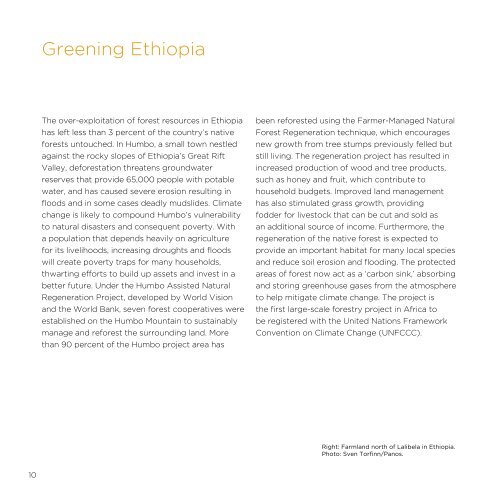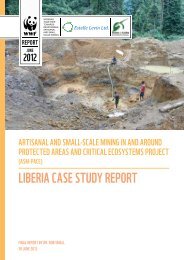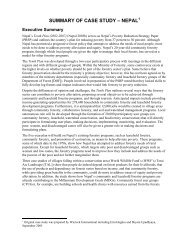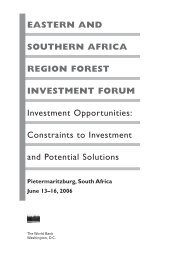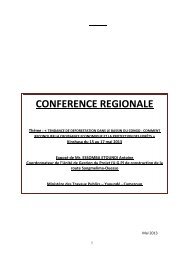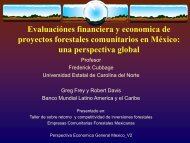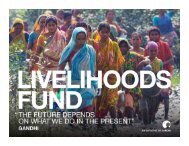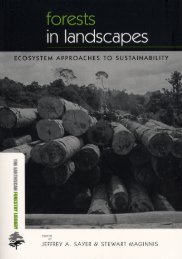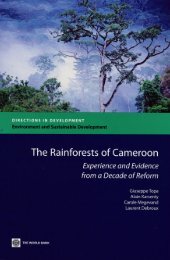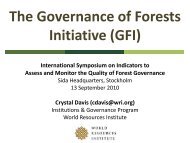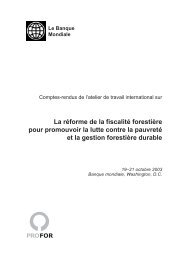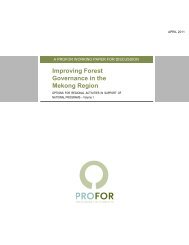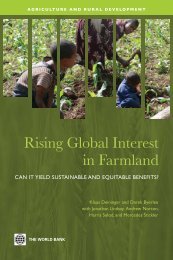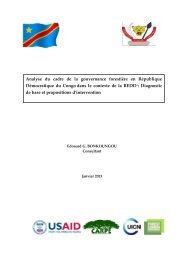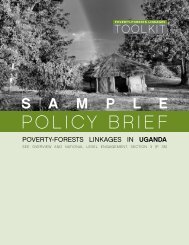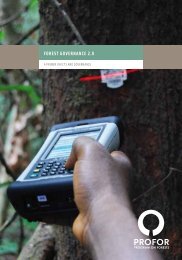Climate Smart Agriculture: A Call to Action - PROFOR
Climate Smart Agriculture: A Call to Action - PROFOR
Climate Smart Agriculture: A Call to Action - PROFOR
Create successful ePaper yourself
Turn your PDF publications into a flip-book with our unique Google optimized e-Paper software.
Greening Ethiopia<br />
The over-exploitation of forest resources in Ethiopia<br />
has left less than 3 percent of the country’s native<br />
forests un<strong>to</strong>uched. In Humbo, a small <strong>to</strong>wn nestled<br />
against the rocky slopes of Ethiopia’s Great Rift<br />
Valley, deforestation threatens groundwater<br />
reserves that provide 65,000 people with potable<br />
water, and has caused severe erosion resulting in<br />
floods and in some cases deadly mudslides. <strong>Climate</strong><br />
change is likely <strong>to</strong> compound Humbo’s vulnerability<br />
<strong>to</strong> natural disasters and consequent poverty. With<br />
a population that depends heavily on agriculture<br />
for its livelihoods, increasing droughts and floods<br />
will create poverty traps for many households,<br />
thwarting efforts <strong>to</strong> build up assets and invest in a<br />
better future. Under the Humbo Assisted Natural<br />
Regeneration Project, developed by World Vision<br />
and the World Bank, seven forest cooperatives were<br />
established on the Humbo Mountain <strong>to</strong> sustainably<br />
manage and reforest the surrounding land. More<br />
than 90 percent of the Humbo project area has<br />
been reforested using the Farmer-Managed Natural<br />
Forest Regeneration technique, which encourages<br />
new growth from tree stumps previously felled but<br />
still living. The regeneration project has resulted in<br />
increased production of wood and tree products,<br />
such as honey and fruit, which contribute <strong>to</strong><br />
household budgets. Improved land management<br />
has also stimulated grass growth, providing<br />
fodder for lives<strong>to</strong>ck that can be cut and sold as<br />
an additional source of income. Furthermore, the<br />
regeneration of the native forest is expected <strong>to</strong><br />
provide an important habitat for many local species<br />
and reduce soil erosion and flooding. The protected<br />
areas of forest now act as a ‘carbon sink,’ absorbing<br />
and s<strong>to</strong>ring greenhouse gases from the atmosphere<br />
<strong>to</strong> help mitigate climate change. The project is<br />
the first large-scale forestry project in Africa <strong>to</strong><br />
be registered with the United Nations Framework<br />
Convention on <strong>Climate</strong> Change (UNFCCC).<br />
Right: Farmland north of Lalibela in Ethiopia.<br />
Pho<strong>to</strong>: Sven Torfinn/Panos.<br />
10


